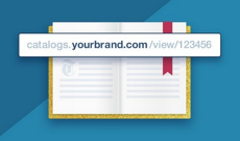Some people still see custom domains as an excessive part of branding, a superfluous feature not worth the money it costs. But is it really the case? In this article, we’re going to argue that there are at least three solid marketing reasons to get a custom domain for your online brand.
What Is a Custom Domain Anyway?
A custom domain or a custom URL is a unique branded link to your website or to a platform where you host your content. It’s not necessarily the same thing as a vanity URL, although sometimes they are used as synonyms. Vanity URLs are short, descriptive, and made up entirely of words, not random numbers, which makes them very easy to remember and pronounce, e.g. https://www.facebook.com/flippingbook/. If someone wants to find a specific page that they’ve already visited, with a vanity URL they can do so without extra effort. A custom URL doesn’t always meet all the criteria of a vanity URL (length, descriptiveness, words only) but it does take a step closer to it compared to an ordinary link.
To give you an example, with FlippingBook you can convert a PDF and get a link to it as an HTML5 publication. By default, your link will look something like this: https://online.flippingbook.com/view/864544. But if you want, you can create a custom domain that will reflect your brand and the nature of your publications. Then, all your links on our platform will look like this: https://catalogs.your-brand.org/view/782964—where “catalogs” can be anything you want.
The situation is pretty much the same on the majority of content hosting platforms, from WordPress to YouTube. When you start a blog or a channel, the name of your online brand in the link is either non-existent (for instance, https://www.youtube.com/channel/UCkRfArvrzheW2E7b6SVT7vQ) or serving as a subdomain to the platform you use (e.g., https://yourblog.wordpress.com/). And, as with FlippingBook, on most of these websites, you can customize the link and get a custom URL.
However, getting a custom domain is often pricey, and that’s what stops some from considering the option. They don’t see it as a reasonable purchase because they don’t understand how it can pay off.
Three Reasons to Get a Custom Domain
If you, too, can’t see the appeal of a branded URL, let us tell you what makes us love it so much.
# 1 It looks trustworthy
Or, as one of our clients put it when talking about our Custom Domain feature, it looks friendly.
Basically, a custom URL is less likely to cause hesitation from a more cautious user who, upon seeing an unknown URL in their inbox, may wonder if they’re being spammed. With a custom domain, a user gets a link, recognizes your brand name in it, and clicks on it without a second thought. They acknowledge it instantly as an extension of your brand and trust it.
#2 You look professional
Even if you’re sure you have your users’ complete trust, a custom domain will still make you seem more earnest, more professional. Like you mean business. It shows your users that you care. Usually, custom URLs are easier to remember, too—which means they work well for customer retention as your users are more likely to revisit the link you’ve sent them. Therefore your business will not only buy a domain name but also get the custom domain to increase customer retention as well.
#3 Google is into branded URLs, too
Google has a soft spot for custom domains, branded links, personalized and vanity URLs. When it comes to search algorithms, Google puts branded URLs higher than their non-specific competitors. Therefore, if you have a custom domain, people who look for your catalogs or offers online will find you quicker—and therefore your organic traffic will increase, too.
Of course, those are not the only reasons to get a custom domain you could think of but they are certainly the main ones. Statistics support them, too: according to Rebrandly, branded URLs receive up to 39% more click-throughs compared to unbranded links.
So, yes, they are paying off.
How to Choose a Custom Domain Name
If you’ve decided that you do need a custom domain after all, how would you go about it? Most importantly, how do you pick a name?
In FlippingBook, for example, you set one custom domain for all of your publications, so you really need to choose wisely.
To make the most of it, remember that aside from advertising your brand, your custom domain should:
- describe where the link leads;
- be easy to understand and remember.
Even a link’s length is less important than these two factors. If your domain name instantly pops into users’ heads and clearly describes what it is they’ll see when they click the link, then you’ve chosen well.
Should You or Shouldn’t You Get One After All?
We say you should.
Custom domains and personalized URLs may have something to do with vanity as their synonym suggests. But as long as they play a role in a user’s decision to click, they should be taken into account. Don’t miss out on this opportunity to make the right impression and ensure your audience’s trust.





